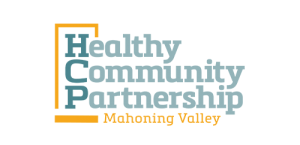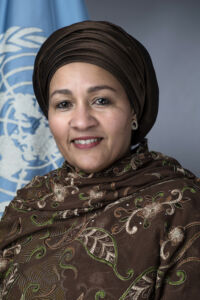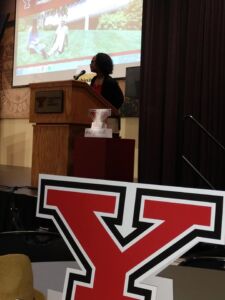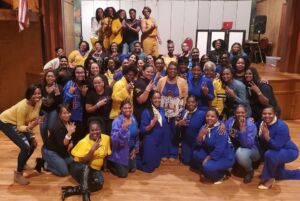HCP Partner Spotlight: Dr. Nicolette Warren Powe
Assistant Professor Health Professions, Bitonte College of Health & Human Services, Youngstown State University
"There is no one size that fits all. We must work country by country, region by region, community by community, to ensure the diversity of needs are addressed to support each reality." – Amina J. Mohammed, Deputy Secretary-General, United Nations
Though challenges–and celebrations–may seem to look the same across communities, the journey to overcoming barriers and achieving milestones are often very different. Every community has a unique combination of elements that, when viewed together, create a kind of fingerprint, technically called a sociogram. The shape and patterns of the sociogram emerges when examining the people, places, and partnerships–and the linkages between them.
Exercises like social network mapping (sometimes called a social network analysis), reveal the who, what, where of a community as well as the beginnings of how and why. These maps can be simple enough to be drawn by hand or complex enough to require special software. Regardless of how they are created, these tools serve the same broader purpose: to provide a path forward to seek solutions, solve problems, and build better, stronger connections to do so.
- Hawai’i Social Network Analysis from the US Climate Resilience Toolkit
- Example of Practice Mapping from Open Network Library
As Amina J. Mohammed, Deputy Secretary-General to the United Nations said, "There is no one size fits all" when it comes to improving the health and quality of life in our communities.
Someone who shares this belief and approach is one of the Partnership's Steering Committee members, Dr. Nicolette Powe.
Dr. Powe is an Assistant Professor at Youngstown State University, Department of Health Professions. She earned her PhD from Loma Linda University, specializing in Health Education and Global Health. She also completed Georgetown University's Nonprofit Management Executive Certificate Program and is a licensed Master Certified Health Education Specialist by the National Commission for Health Education Credentialing.
Beyond teaching and inspiring the next generation of public health professionals, Dr. Powe has shared her time and talents with her community as a member of the Professional Development Board of Trustees for the Society for Public Health Education (SOPHE). She also served as the Director of Health Equity at SOPHE, where her main duties were to address racial and ethnic community-based policy, systems, and environmental changes to reduce the risk factors associated with chronic diseases. She was also tasked with leading SOPHE's additional efforts on health equity, which included overseeing the National Implementation and Dissemination for Chronic Disease Prevention project focused on building and strengthening the community's ability to use population-based strategies that contribute to healthier populations.
In her role as the Director of Health Equity, Dr. Powe also served as the co-chair of the Office of Minority Health, Mid-Atlantic Regional Health Equity Council and National Commission for Health Education Credentialing, Division Board of Professional Development.
Before relocating to Youngstown, Dr. Powe was the volunteer Executive Director for Project FACT (Faith groups Addressing Health through Community Together), which is a non-profit community organization created to increase the number of faith-based groups collaborating with public agencies to support healthy active neighborhoods and communities. Project FACT's mission is to provide leadership to faith-based and community organizations and to contribute community-based initiatives for the elimination of health disparities through education, training and partnership. Some of the activities Project FACT offers include community-based physical activity, nutrition and other health promotion intervention opportunities such as community gardening, walking programs, youth entrepreneurship, lay health ministry advisors training, and other health related activities. Project FACT's partnerships include public agencies, local churches, community service organizations and ministerial alliances in Wake County and surrounding areas in North Carolina.
Dr. Powe is also an active member of Sigma Gamma Rho Sorority, Inc.
It is easy to see Dr. Powe's commitment and connection to community throughout her work as a public health professional and educator. She immerses herself in learning about the people and the place wherever she's working to better understand its unique pattern of celebrations and challenges. Again, it is important to recognize these differences and respond to them to ensure success– "one size fits all" does not fit at all. Dr. Powe makes sure to share this approach with her students so they have a clear understanding about how the work of public health happens in public. During her time with the Partnership, she's been instrumental in connecting her students with our partners to provide them with unique hands-on opportunities to see how public health happens in real time in real life with real people.
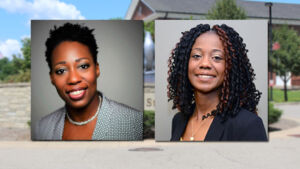
Michelle Edison & Dr. Powe featured in an article by the Business Journal "Public Health Experts to Address Health Equity"
Last year, Dr. Powe moderated a series in collaboration with YSU Alumni Engagement called "My Path to Public Health" that followed the paths of local public health professionals throughout their careers. Coincidentally, these public health leaders also happen to be Partnership members. The first focused on the path of Erin Bishop, Health Commissioner for the Youngstown City Health District. The second interview in the series followed Michelle Edison, Director of Health Equity Strategies and Initiatives at Mahoning County Public Health.
Building on the success of these service learning projects and approaches, Dr. Powe hopes to use these experiences to advocate for a dedicated service learning program at YSU. The goal of such a program would be to provide students throughout the university with opportunities to work directly with community partners to build skills, confidence, and relationships. This method of learning is a win-win-win for the students, the university, and the community. The short term benefits are providing practical teaching and learning opportunities for students and support to community partners. Longer term benefits include recruitment and retention opportunities for the universities and, hopefully, the broader community should students decide to stay here post-graduation.
The Partnership has benefited in many ways from Dr. Powe's belief in and advocacy for service learning. One example is last fall, we had the privilege of working with two teams of Masters of Public Health students. The teams worked with Partnership members to conduct an assessment of our network to determine how to best implement a health and equity in all policies framework throughout our coalition. Their research and recommendations continue to inform how we proceed pursuing this goal and how to address significant capacity issues through additional service learning opportunities with YSU and/or other educational partners.
Over the four years that the Partnership has been on our journey, Dr. Powe has walked with us, side by side–taking every step forward and the occasional step back. We are grateful for her and her students, who we hope will continue helping us map out our challenges and celebrations, so that we can continue pressing onward to refine and clarify our vision of a Mahoning Valley that is healthy, vibrant, equitable, and prosperous. And making sure our actions and activities are addressing the needs of our community in ways that fit.
